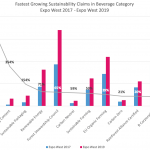5 things you may not know about the rise of meatless burgers

Meatless burger buyers aren’t just the vegetarians and vegans; but omnivores too. Approximately 1/3 of the U.S. population identifies as a flexitarian, compared to 7% who are vegetarian or vegan. The Good Food Institute points out that an astounding “93% of the consumers in conventional grocery stores that are buying a Beyond Meat product are also putting animal meat in their basket” (GFI, CNBC).

Restaurant sales of meat alternatives have risen 268% this year (2018-2019), according to Dining Alliance, compared to just 21.66% between 2017 and 2018.

It’s hard to name a fast food restaurant that has beef with this trend. The following restaurants are now offering a meat alternative: Burger King, Carl’s Jr., Little Caesars, Qdoba, Tim Horton, Red Robin, Del Taco, White Castle, Chipotle, KFC (U.K.), McDonald’s (Germany), TGI Fridays, Cheesecake Factory, Dunkin’ Brands, and more. (Anyone else getting hungry yet?)

The difference between the Impossible Burger and the Beyond Burger? It all griddles down to the main ingredient. The Impossible Burger is made from soy protein (and soy leghemoglobin, the secret sauce that makes the burger “bleed”), while the Beyond Burger is made from pea protein and beet “blood.” Which one of these alt-burgers wins in a popularity contest? Glad you asked… In a non-representative, but large (5,000) consumer study conducted this summer by NEXT Data & Insights and Suzy, 45% of those that had bought a meat alternative in the past 3 months said they’d tried a Beyond Burger, while 34% had tried an Impossible Burger.

Why the shift towards plants and away from animals? In the same NEXT/Suzy study, 67% said it was because meatless burgers are healthier, while 46% said they are a more environmentally friendly option or better for animal welfare. The NEXT team has also found that 31% of U.S. households say they are trying to eat a largely plant-based diet.
Are you ready to sink your teeth into the plant-based trend? Contact the NEXT Data & Insights team to learn more about our Concept Lab, trend tracking and analysis and our brand new off-the-shelf, quick-turn market research solutions.



